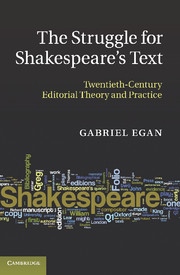Book contents
- Frontmatter
- Contents
- Preface
- Acknowledgements
- A note on references, quotations, names and pronouns
- Introduction
- 1 The fall of pessimism and the rise of New Bibliography, 1902–1942
- 2 New techniques and the Virginian School: New Bibliography 1939–1968
- 3 New Bibliography 1969–1979
- Intermezzo: the rise and fall of the theory of memorial reconstruction
- 4 New Bibliography critiqued and revised, 1980–1990
- 5 The ‘new’ New Bibliography: the Oxford Complete Works, 1978–1989
- 6 Materialism, unediting and version-editing, 1990–1999
- Conclusion: the twenty-first century
- Appendix 1 How early modern books were made: a brief guide
- Appendix 2 Table of Shakespeare editions up to 1623
- Appendix 3 Editorial principles of the major twentieth-century Shakespeare editions
- Works cited
- Index
Preface
Published online by Cambridge University Press: 06 December 2010
- Frontmatter
- Contents
- Preface
- Acknowledgements
- A note on references, quotations, names and pronouns
- Introduction
- 1 The fall of pessimism and the rise of New Bibliography, 1902–1942
- 2 New techniques and the Virginian School: New Bibliography 1939–1968
- 3 New Bibliography 1969–1979
- Intermezzo: the rise and fall of the theory of memorial reconstruction
- 4 New Bibliography critiqued and revised, 1980–1990
- 5 The ‘new’ New Bibliography: the Oxford Complete Works, 1978–1989
- 6 Materialism, unediting and version-editing, 1990–1999
- Conclusion: the twenty-first century
- Appendix 1 How early modern books were made: a brief guide
- Appendix 2 Table of Shakespeare editions up to 1623
- Appendix 3 Editorial principles of the major twentieth-century Shakespeare editions
- Works cited
- Index
Summary
The origins of this book lie in the negative response I received to a proposal for an edition of All's Well that Ends Well in Michael Best's series Internet Shakespeare Editions in the final years of the last millennium. An anonymous peer reviewer's criticisms of my wildly ambitious plan for the edition were grounded in the belief that the entire edifice of what is known as New Bibliographical editorial theory and practice had recently been overturned and that the most I might offer would be to reprint the Folio text of the play purged of its egregious errors. In making sense of this reader's report and its rejection of my proposal I felt the need for a history of the intellectual tradition of the New Bibliography and an account of the growing influence of its detractors since the 1970s. There was no such history in existence and this book fulfils my desire to write one; I hope it also fulfils a need felt by others for such a history. In the early 1940s F. P. Wilson surveyed the New Bibliographical tradition up to that point, but since then there have been only journal articles and book chapters that address particular parts of the tradition, or briefly summarize the whole of it, sometimes to defend but mostly to attack it. In this book I attempt to tell the full story from the beginning of the twentieth century to the date of writing (2010).
- Type
- Chapter
- Information
- The Struggle for Shakespeare's TextTwentieth-Century Editorial Theory and Practice, pp. viiPublisher: Cambridge University PressPrint publication year: 2010
- 1
- Cited by

